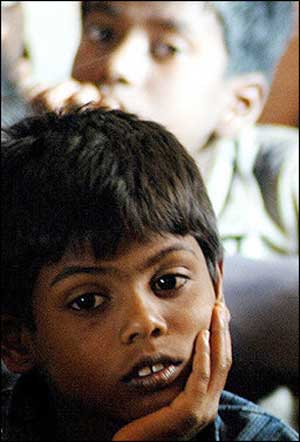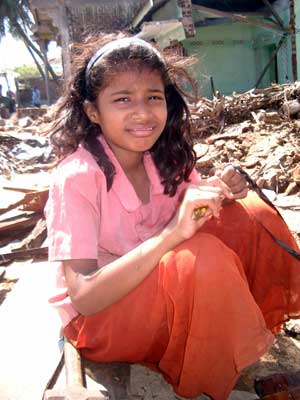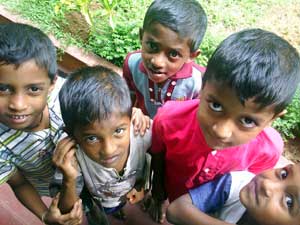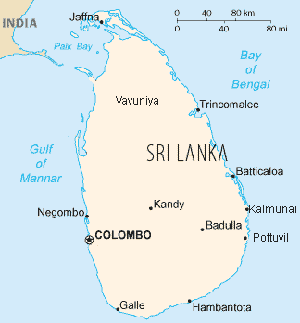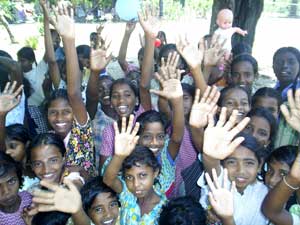
|
||||||||||
|
| ||||||||||
Sri Lanka orphans caught up in bureaucracy
By Ravi R. PrasadTrincomalee, Sri Lanka, Jan. 18 (UPI) -- Nishanthan is barely two years old. He cannot walk because of a deformity in his waist. The child sits on the uneven sand under one of the thousands of makeshift shelters provided by the United Nations High Commissioner for Refugees. In spite of his handicap, Nishanthan survived. It was a miracle. His able-bodied parents and siblings were swept away by the killer wave that claimed lives of some 38,000 people in the island nation of Sri Lanka. "All he does throughout the day is cry," said 60-year-old Jayaratnam, a neighbor who is now taking care of Nishanthan in the welfare camp. "He keeps saying, 'Amma, Amma,' crying out for his mother. He doesn't know that his mother will never come back." When the giant ocean wave hit, Nishanthan was seated in a plastic tub and his mother was bathing him. His fisherman father had gone to see his boat tied at the pier. The family lived along the coast at Kucchuvely village in the eastern Trincomalee district. Jayaratnam's wife, Sellamma, had gone to fetch some curd from Nishanthan's mother and had seen the child. A few minutes after Sellamma returned home, the tsunami hit the coast. Jayaratnam and Sellamma hugged a coconut tree and survived, but their two children were washed away. In the neighborhood, Nishanthan's family was not so lucky. They perished. When the water cleared out after half an hour, Jayaratnam heard the child crying. He spotted the basin perched on a coconut tree. The waves had thrown the plastic basin up, and it landed on the tree between the leaves. Jayaratnam climbed the tree and brought Nishanthan down. The boy did not even have a scratch. When Jayaratnam moved with his wife to the welfare camp, he brought Nishanthan along. There was nobody to look after the disabled child, and the couple thought it was their responsibility to take care of him. Living under a tent, sleeping on mats with a couple of bed sheets and pillows, the family of three now depends on handouts given by district officials and aid agencies. The only toy that Nishanthan has is a bucket with a lid, provided by Oxfam. Now couple is finding it difficult to take care of the two-year-old. They are too old to bring up the child. So they have decided to send him to an orphanage. "I don't have any income, and the needs of a growing child are far too much for me to meet," said Jayaratnam. "My wife is suffering from arthritis, so she cannot take care of the baby." On Saturday Jayaratnam went to an orphanage in Trincomalee town to leave the child there. It was a harrowing experience both for him and the child. The two traveled for hours, half the time Jayaratnam carrying the child and walking because the roads are bad and no public transport is available. Several aid agency vehicles whizzed past and Jayaratnam tried to hitch a ride, but none of them stopped. Some of them did not even have anyone other than the driver. As Jayaratnam came closer to the town, an aid agency vehicle gave him a ride in a pickup truck. Almost two hours after he had left the camp, the man and the child reached the orphanage. "Good that you have brought the child here," said the matron of the orphanage, as she asked Jayaratnam to wait for a senior official. "I cannot admit the child, it has to be decided by the warden and some procedures have to be followed." After an hour-long wait, the warden-cum-manager of the home turned up. He complained about how he had to wait for the local government official to get food stamps for children in the orphanage. "We cannot take the child," said the manager, handing over a printed form to Jayaratnam. "Please fill this up, get the signatures of the Gram Sewaka (village officer), Divisional Secretary, officer of the child probation department and a relative." The officer told Jayaratnam that unless he got these signatures -- and, most important, the death certificate of Nishanthan's parents -- the orphanage cannot accept the child. "Where will I get the death certificates?" asked Jayaratnam. "Everyone in his family is dead. Who will inform the registrar?" Determined to get Nishanthan a place in the orphanage, the man walked another mile to the office of registrar of birth, deaths and marriages. The office was closed for the weekend. "To get the death certificates, I need to contact the Gram Sewaka," he said. "God knows if he survived or was killed." The government has banned adoption of tsunami orphans. If someone complains that Jayaratnam has kept the child, the government could take action against him. With fear of police arresting him for sheltering Nishanthan, the old man returned to the camp walking all the way. "Ever since the government has banned adoption, we have been flooded with requests to admit more and more orphans," said Vyasa Kalyansundaram, a trustee of Sivananda Tapovanam children's home. "How can the government expect an orphan child to run around and get signatures and death certificates of parents?" Orphanages are willing to expand and take in more children, but the government rules need to be changed. "The government banned adoption without thinking about the plight of orphans. They need to change the rules for admitting children to orphanages. Many of these rules need to be scrapped," Kalyansundaram said. Originally published 18 January 2005 in The Washington Times
|
